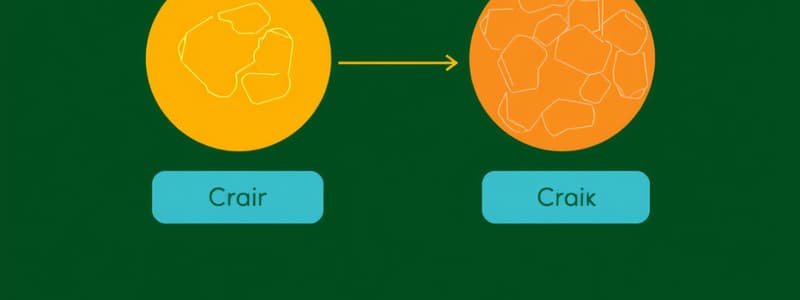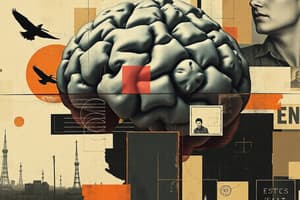Podcast
Questions and Answers
Which of the following types of memory holds sensory input until we can attend to and recognize it?
Which of the following types of memory holds sensory input until we can attend to and recognize it?
- Semantic memory
- Episodic memory
- Short term memory
- Sensory memory (correct)
Our short term memory capacity is BLANK +2 chunks.
Our short term memory capacity is BLANK +2 chunks.
7
Which of the following types of memory has the shortest duration?
Which of the following types of memory has the shortest duration?
- Sensory memory (correct)
- Short-term memory
- Episodic memory
- Semantic memory
Procedural memories are BLANK memories and thus are probably processed in the BLANK.
Procedural memories are BLANK memories and thus are probably processed in the BLANK.
Which of the following leads to the best long-term memory?
Which of the following leads to the best long-term memory?
The primary and recency effects in free recall demonstrate that we have the greatest difficulty recalling the words BLANK of a list.
The primary and recency effects in free recall demonstrate that we have the greatest difficulty recalling the words BLANK of a list.
Which of the following is not a mnemonic aid?
Which of the following is not a mnemonic aid?
An essay test measures BLANK and a multiple-choice test measures BLANK.
An essay test measures BLANK and a multiple-choice test measures BLANK.
Which of the following theories of forgetting argues that the forgotten information was in long-term memory but is no longer available?
Which of the following theories of forgetting argues that the forgotten information was in long-term memory but is no longer available?
Piaget's false memory of a kidnapping attempt when he was a child was the result of BLANK.
Piaget's false memory of a kidnapping attempt when he was a child was the result of BLANK.
After learning the phone number for Five Star Pizza, Bob cannot remember the phone number he learned last week for the Donut Connection. After living in Los Angeles for three years, Jim is unable to remember his way around his hometown in which he had lived the previous 10 years prior to moving to Los Angeles. Bob is experiencing the effects of BLANK interference, and Jim is experiencing the effects of BLANK interference.
After learning the phone number for Five Star Pizza, Bob cannot remember the phone number he learned last week for the Donut Connection. After living in Los Angeles for three years, Jim is unable to remember his way around his hometown in which he had lived the previous 10 years prior to moving to Los Angeles. Bob is experiencing the effects of BLANK interference, and Jim is experiencing the effects of BLANK interference.
Per the levels-of-processing theory, which of the following questions about the word 'depressed' would best prepare you to correctly remember tomorrow that you had seen the word in this practice question today?
Per the levels-of-processing theory, which of the following questions about the word 'depressed' would best prepare you to correctly remember tomorrow that you had seen the word in this practice question today?
The forgetting curve for long-term memory in Ebbinghaus's relearning studies with nonsense syllables indicates that BLANK.
The forgetting curve for long-term memory in Ebbinghaus's relearning studies with nonsense syllables indicates that BLANK.
In the Loftus and Palmer experiment, participants were shown a film of a traffic accident and then later tested for their memory of it. The finding that memory differed based upon the specific words used in the test questions illustrated BLANK.
In the Loftus and Palmer experiment, participants were shown a film of a traffic accident and then later tested for their memory of it. The finding that memory differed based upon the specific words used in the test questions illustrated BLANK.
The results for the experiment in which word lists were studied either on land or underwater and then recalled either on land or underwater provide evidence for BLANK.
The results for the experiment in which word lists were studied either on land or underwater and then recalled either on land or underwater provide evidence for BLANK.
Flashcards are hidden until you start studying
Study Notes
Memory Types and Functions
- Sensory Memory: Holds sensory input temporarily until recognition occurs; crucial for initial processing.
- Short-Term Memory Capacity: Average capacity is approximately 7±2 chunks of information.
- Types of Memory Duration: Sensory memory has the shortest duration among memory types.
Memory Processing
- Procedural Memories: Are implicit memories managed by specific brain regions, often related to motor skills.
- Elaborative Rehearsal: Considered the most effective method for transferring information to long-term memory compared to maintenance rehearsal.
Recall and Recognition
- Primary and Recency Effects: Difficulty recalling items particularly occurs in the middle of a list.
- Essay vs. Multiple-Choice Tests: Essay tests assess recall, while multiple-choice tests assess recognition.
Theories of Forgetting
- Storage Decay Theory: Suggests forgotten information remains in long-term memory but is unavailable.
- Source Misattribution: Incident exemplified by Piaget's false memory related to a childhood event.
Interference in Memory
- Proactive vs. Retroactive Interference:
- Proactive interference: Earlier learned information hinders new memory (Bob's phone numbers).
- Retroactive interference: New information hinders recall of previously learned information (Jim's navigation skills).
Levels of Processing
- Depth of Processing: Questions that require personal connection, such as “How well does the word describe you?” promote stronger memory retention.
Forgetting Curves and Memory Retention
- Ebbinghaus's Forgetting Curve: Memory retention shows that significant forgetting happens quickly and levels off over time.
Misinformation Effect
- Loftus and Palmer Experiment: Demonstrated how wording in questions can alter recollection of events, highlighting the misinformation effect.
Contextual Encoding
- Encoding Specificity Principle: Memory performance improves when retrieval occurs in the same context as the initial learning experience (e.g., land vs. underwater recall study).
Studying That Suits You
Use AI to generate personalized quizzes and flashcards to suit your learning preferences.




